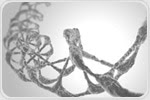| |  A discovery by researchers from the School of Basic & Medical Biosciences and NIHR Guy's and St Thomas' Biomedical Research Centre could lead to new treatments for severe acne. Scientists found 15 genome regions linked to developing the condition. A discovery by researchers from the School of Basic & Medical Biosciences and NIHR Guy's and St Thomas' Biomedical Research Centre could lead to new treatments for severe acne. Scientists found 15 genome regions linked to developing the condition. | |
|
| |  A change in the genome of Caucasians could explain much-higher rates of the most common type of esophageal cancer in this population, a new study finds. It suggests a possible target for prevention strategies, which preliminary work suggests could involve flavonoids derived from cranberries. A change in the genome of Caucasians could explain much-higher rates of the most common type of esophageal cancer in this population, a new study finds. It suggests a possible target for prevention strategies, which preliminary work suggests could involve flavonoids derived from cranberries. | |
|
| |  Genetics play a crucial role in predisposition to various dental diseases. Research has indicated a close association with individual genetic makeup and occurrence of various dental conditions such as caries and periodontal diseases. Genetics play a crucial role in predisposition to various dental diseases. Research has indicated a close association with individual genetic makeup and occurrence of various dental conditions such as caries and periodontal diseases. | |
|
| |  Nova Southeastern University researchers recently discovered that by testing the level of NER (nucleotide excision repair) gene expression, pediatric oncologists can determine the likelihood of early relapse (less than three years) in their acute lymphoblastic leukemia patients. Nova Southeastern University researchers recently discovered that by testing the level of NER (nucleotide excision repair) gene expression, pediatric oncologists can determine the likelihood of early relapse (less than three years) in their acute lymphoblastic leukemia patients. | |
|
| |  Estonian scientists have announced the invention of a genetic testing technology that allows the number of clinical biomarkers to be analyzed at the single-molecule level, which enhances the sensitivity of tests in precision medicine and will make them more affordable in future. Estonian scientists have announced the invention of a genetic testing technology that allows the number of clinical biomarkers to be analyzed at the single-molecule level, which enhances the sensitivity of tests in precision medicine and will make them more affordable in future. | |
|
| |  Much time and effort are expended on antibody studies, but these can only produce successful and reproducible outcomes if the antibody used is specific. Antibody specificity refers to whether the molecule is capable of binding the target consistently with minimal or no cross-reactivity. In such cases, it is essential that researchers should be able to rely on the performance of the antibody because of its centrality in their work. Much time and effort are expended on antibody studies, but these can only produce successful and reproducible outcomes if the antibody used is specific. Antibody specificity refers to whether the molecule is capable of binding the target consistently with minimal or no cross-reactivity. In such cases, it is essential that researchers should be able to rely on the performance of the antibody because of its centrality in their work. | |
|
| |  A new study has revealed that cannabis or marijuana can alter the DNA or genetic make-up of the sperms and this can have long term consequences in the baby born of that sperm. The study results were published in the latest issue of the journal Epigenetics. A new study has revealed that cannabis or marijuana can alter the DNA or genetic make-up of the sperms and this can have long term consequences in the baby born of that sperm. The study results were published in the latest issue of the journal Epigenetics. | |
|
| |  Machine learning is the study of algorithms and statistical models that computer systems use to progressively improve their performance on a specific task. It is clearly visible that, machine learning is essential in this era in which we are living in, when there is huge amount of epigenetic data present coming from experiments and the clinic. Machine learning is the study of algorithms and statistical models that computer systems use to progressively improve their performance on a specific task. It is clearly visible that, machine learning is essential in this era in which we are living in, when there is huge amount of epigenetic data present coming from experiments and the clinic. | |
|
| |  Scientists at The Francis Crick Institute have discovered a simple set of rules that can be used to precisely predict how DNA will be modified by the CRISPR gene editing technique. Scientists at The Francis Crick Institute have discovered a simple set of rules that can be used to precisely predict how DNA will be modified by the CRISPR gene editing technique. | |
|
| |  Researchers at the University of Melbourne have made an important discovery that explains why some babies are born with disorders of sex development. The study suggests that a critical regulatory gene carried on the Y chromosome increases or decreases the activity of particular gene that determine whether a baby will be male or female. Researchers at the University of Melbourne have made an important discovery that explains why some babies are born with disorders of sex development. The study suggests that a critical regulatory gene carried on the Y chromosome increases or decreases the activity of particular gene that determine whether a baby will be male or female. | |
|
| |  Stem cell discovery began in the 1950s from an unusual source - teratocarcinomas and tumors containing a variety (or heterogeneous mix) of tissue types. These include fully specialized, differentiated structures such as teeth and hair. Stem cell discovery began in the 1950s from an unusual source - teratocarcinomas and tumors containing a variety (or heterogeneous mix) of tissue types. These include fully specialized, differentiated structures such as teeth and hair. | |
|
| |  Genetically diverse bacterial strains that cause urinary tract infections differ in their ability to trigger protective immune responses in mice, potentially explaining why these infections frequently recur in many patients, according to a study published December 13 in the open-access journal PLOS Pathogens by Thomas Hannan and Scott Hultgren of Washington University School of Medicine, and colleagues. Genetically diverse bacterial strains that cause urinary tract infections differ in their ability to trigger protective immune responses in mice, potentially explaining why these infections frequently recur in many patients, according to a study published December 13 in the open-access journal PLOS Pathogens by Thomas Hannan and Scott Hultgren of Washington University School of Medicine, and colleagues. | |
|
| |  The research is published in today's issue of Nature Communications. It greatly advances knowledge of the underlying biological causes of epilepsy and may inform the development of new treatments for the condition. The research is published in today's issue of Nature Communications. It greatly advances knowledge of the underlying biological causes of epilepsy and may inform the development of new treatments for the condition. | |
|
| |  Cell death activates different intracellular enzymes, such as lipases, proteases, and nucleases. Lysosomes, that contain hydrolytic enzymes, can break down biomolecules like histone proteins. The removal of histone proteins in turn facilitates the action of endonucleases that can cleave DNA. Cell death activates different intracellular enzymes, such as lipases, proteases, and nucleases. Lysosomes, that contain hydrolytic enzymes, can break down biomolecules like histone proteins. The removal of histone proteins in turn facilitates the action of endonucleases that can cleave DNA. | |
|
| |  cfDNA refers to naked DNA fragments that occur within the bloodstream. The current study was designed to test whether changes in these fragments could be used to predict a biological age, which describes an individual’s functional status rather than their chronological age. cfDNA refers to naked DNA fragments that occur within the bloodstream. The current study was designed to test whether changes in these fragments could be used to predict a biological age, which describes an individual’s functional status rather than their chronological age. | |
|
| |  Biologists studying Parkinson's disease have long hoped to solve the mystery of the telltale "clumps." Scientists want to know how clumps of misfolded proteins damage brain cells and contribute to the disease. Biologists studying Parkinson's disease have long hoped to solve the mystery of the telltale "clumps." Scientists want to know how clumps of misfolded proteins damage brain cells and contribute to the disease. | |




















































No hay comentarios:
Publicar un comentario